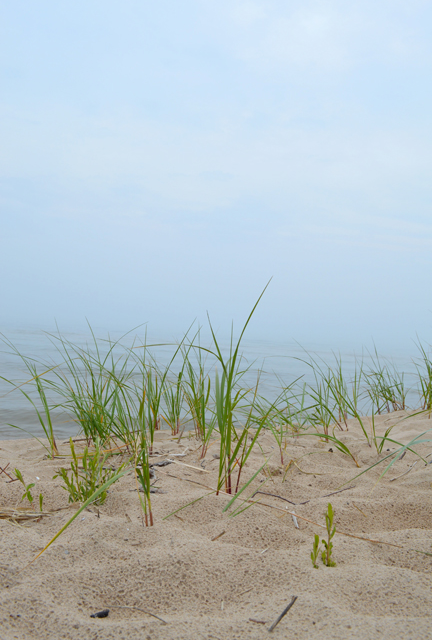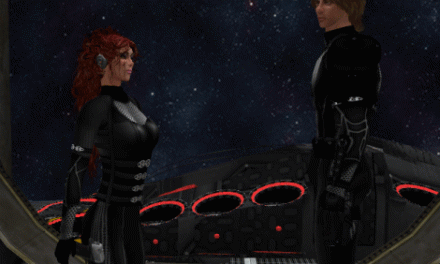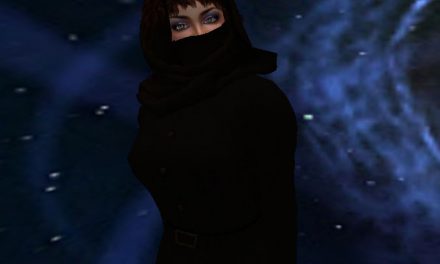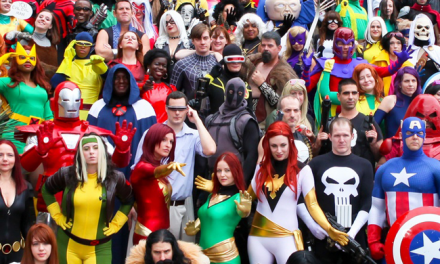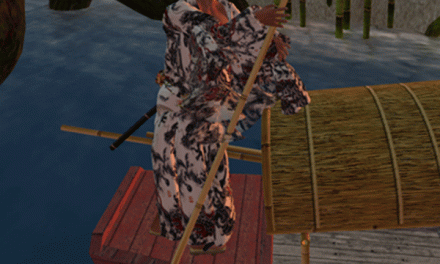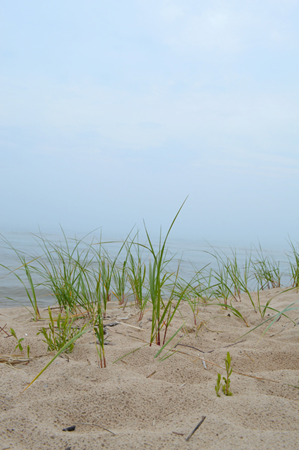 The Ride Out
The Ride Out
by
Nicholas Stillman
In Ricky’s time, the world could kill him simply for standing up. He crawled through the beachgrass, the Earth’s last forage grounds, never daring to lift his head more than a few inches from either soil or sand. Though his neck muscles ached, he yearned to rise higher and gaze at the bit of the world people could still access. Above him, just a meter over his prostrate body, the radioactive cloud waited. It crept as Ricky did, close to the Earth and drifting, looking for life to consume.
The death cloud, however, devoured more than just the insects and wild berries on mankind’s menu of luxuries. The fallout hung everywhere above, suspended indefinitely in a partial nuclear winter. The radioactive troposphere had worldwide coverage and near invisibility, like a clear, aerial acid. It looked as safe and clean as the meter-high layer of good air just underneath. Ricky, by comparison, had only his nimble arms and legs, his torso which slid along like an appendage itself, and his ragged, sweaty work clothes. By now the tracksuit felt truly broken in for the art of scavenging. The seams still tore a little where they needed to, like a lizard’s dead skin all but ready to molt off completely.
Ricky paused his crawl. He lay on his stomach and suppressed a grunt which might scare away bugs. After a moment’s thought, he unzipped the empty fanny pack over the back of his belt. A grasshopper could, by some miracle, crawl inside it doing a tad of the work for him. If flukes could happen out here, like a downward gust pushing the death cloud onto his brain, then maybe good flukes could happen too. The girls his age knew nothing of such strategies, but they loved all the exotic little treats he had given them thus far, even the dried crickets.
He didn’t rest, not really. He simply stayed extra low while checking the Geiger map strapped to the back of his left hand. The mobile device had foot long probes extended off it like whiskers. They helped him push down wider tufts of beach grass for a better view. The screen displayed the three-dimensional space around him in an eight-meter hemisphere. It colored the death cloud blue, ironically the hue of the sky before it had turned slightly gray two decades ago. The dimmed-out layer beneath the blue, his crawl space under the death cloud, showed only safe counts of background radiation. He still had freedom in his plane of movement—freedom to crawl like the bugs that so often escaped him.
The ground deserved a hug from him nonetheless. Somehow, the unique strip of coast pushed the fallout away from the Earth. Ricky felt that wonderful twist of physics with every breath, though he couldn’t explain the reason for his safety. He inhaled the dewy air and let its springtime warmth settle in his mouth. He felt the crashing waves far ahead of him pushing their briny scent shoreward to his face. The grasses here grew taller and filtered the draft coming in along the dagger-shaped cove. Some strange and miraculous mix of humidity and regional currents made the death cloud buoyant.
He crawled onward, quickly approaching the edge of the dunes. Just beyond those last tufts of grass, the sea tussled with a short stretch of beach. A slight change in the wind struck his nose, and his body went numb with the fear of continuing out this far. He froze and tried to retain that numbness. He would need it for a painless retreat on all fours, a mad race back should the wind push in a lower death cloud from outside the region.
A new odor on the breeze taunted him, perhaps the smell of dead starfish. He inhaled the stench and shuddered. After the shudder, he salivated. It always happened like this when venturing outside. The potential food off a beach could feed him daily, almost enough to let him quit his vault-digger job. He would need the reflexes and speed of a fox, however, to outrace the average wind velocity this far from the vault network. Ricky shuddered again, for not even foxes had survived the global contamination.
The dumpy kid up ahead had nothing foxlike about him. He lay there lazily on the dunes, peeking through the beachgrass at the waves, not even checking his Geiger map—not once. Ricky sighed and scrambled toward him, checking his own device with every lunge and thump of his left hand on the ground.
Ricky hardly knew the kid, Barry, and could hardly think of a reason to agree with meeting him here. They ate lunch at the same steely table in the work-zone cafeteria.
That alone grouped them in the same age category, 16, for hazmat training purposes. They both looked as glum as all the other 16-year-olds in the minutes before suiting up to return to the daily dig. They had both scavenged their broken Geiger maps from the workplace recycling bin and repaired them, even though Barry sounded more versed in biology than electronics. None of their commonalities, including their separate journeys outside, seemed like enough to risk a deadly radiation dose.
Barry had extra body weight, though. That could only mean he had extra food.
Ricky crawled beside him and collapsed on his stomach. Barry, entranced by the seafront, took no real notice. Parting the thin curtain of beachgrass, Ricky caught his first close view of the Atlantic. The waves rolled toward him like glimmering hills. Nothing perturbed their rhythm, and not one ship in the world ever would again. The ocean seemed celebratory, never slowing once to mourn the destruction of her beloved neighbor, the land. The young men stared at the smoking clumps of earth distant enough to pose as shadows. On a peninsula they couldn’t name, a small mushroom cloud began its post-fireball bloom. Its rising column puffed out with new plumes like cancerous bulbs. The billowing cloud above collapsed on itself and yet expanded even more. The pall grew, turning light into night around the whole landmass. The ejecta became impossibly ugly, obscuring everything, even good dreams that might come later.
At least the rumble from the blast faded to nothing over the hum of the waves. Ricky squinted at the overkilled land, but couldn’t discern the monument or once-pricey real estate that now played in the sky. He pictured some warmonger in a spacious bunker somewhere wincing at the damage. He pictured another warmonger grinning, finally flexing his small nation’s money muscles by joining the nuclear war. He wondered which backwater country had joined in today, launching its own little warhead with its own little voice. After all, the smaller “acceptable” nukes, the treaty-friendly ones, did such tiny harm compared to the banned ones.
Ricky forced his eyes down to his Geiger map—always the Geiger map—every few seconds. No exceptions. No excuses. When the triple checks confirmed his safety, he scanned the beach. The untouched sand lay just a foot below his perch of dunes like a fossilized plane of smaller brown waves. He spotted no crawling food or crab tracks. His eyes prowled on, in search of anything that could manage a life cycle in the irradiated ecosystem. Little else could justify the risk of crawling this far.
All of his doubts about Barry soared. Ricky sized him up between glances at the Geiger map. The lethargic kid only starred. He gazed shoreward, but at nothing, nothing that mattered. Ricky’s eyes darted in all directions, even upward. If the accursed sky started flashing with denser radioactivity, then he would become the first to notice and master those warnings. If the wind blew any fallout his way, a few grains of blowing sand could signal him to flee long before the blue pixels danced across his screen. He didn’t expect such merciful hints from the world, but for God’s sake, why would anyone stop looking?
He wanted to scream it in Barry’s ear which rested so conveniently beside him. Eerily, Barry still hadn’t looked at his own Geiger map.
“Staying spry?” Barry asked. “You may as well save your battery power. I’ve got mine on.”
“Barry,” Ricky said through clenched teeth, “if I had a map for each hand and one in my mouth, I’d leave all of them on. You know what else I do on my days off? I practice looking at map footage—all of it, because I can’t afford a cancer doc. Now do you want to tell me about this huge favor you mentioned?”
Barry got the hint and looked at Ricky. After that one gesture, though, he resumed his gaze at the ocean.
“The death cloud might cause more than just beta burns and cancer,” Barry said. “By now, the rad dose from a five-second exposure could kill you in a week.”
“Then why do you come out this far?” Ricky asked.
“I hope to make some crucial findings today. I just need you to take my camera back to the vaults in case I don’t make it back. You only have to come out here once more two hours from now, and only if I get killed.”
“Why?” Ricky asked. He glanced at Barry’s Geiger map and noticed a small video camera taped to its side.
“I made a special discovery here,” Barry said. “It will help save at least some of humanity. Proof of human survival outside the vaults will inspire people inside the vaults. My findings will prevent depression and mass suicide, just from the knowledge that our species has a chance to live outside again.”
“So they’ll ride out the despair and cramped conditions just because two guys can crawl around through some grass?” Ricky asked.
“No. I can’t explain it now. You’d have to see the proof to believe it.”
Ricky looked at the sky again, futilely. “The proof all around us really sucks, Barry.”
“Don’t worry,” Barry said. “I brought you some payment, a little something to ruminate on. People really need to see what I’ve seen out here.”
Ricky scanned the darker, wet swath of the beach. The waves giggled as they washed over the sand, a taunting sound entirely new to him. Even if a plump, wounded seal flopped onto the shore, no sane scavenger would crawl that far from the vaults to spear it to death.
Two more sickening mushroom clouds erupted close to the first one which still plumed. The trio merged, and by simple math, their amalgam ruined as much of the Earth as a larger, banned warhead. Ricky grimaced, for scavenging outdoors could become impossible within a decade. The vaults would give the rulers irresistible, absolute control over the world population.
Ricky pulled his eyes away from the ash-spewing spectacle. Between map checks, he glanced at Barry’s Geiger map as well. Two device readings instead of one gave him some relief, a relaxing of just a few of his wiry chest muscles. The rest of him remained poised to dart away. He wondered if the tiny camera on Barry’s device would even survive a brush by the death cloud.
The salty breeze hit both their faces harder here. Ricky prayed the salinity somehow added more protection, reinforcing the breathable layer. He said nothing of Barry’s suicidal hobby of discovery, whether it involved bird watching or some vain hope that the polluted atmosphere might change. He turned his glare toward his map screen where the blue pixels flinched more than he did.
“Look!” Barry yelled. He aimed his camera-map apparatus at the ocean.
A head emerged from the waves some 16 meters out to sea. A film coated the humanoid’s pallor skin like a glistening slime. Under the sheen, the face appeared equally lifeless and flat, like another inanimate layer. Seven more of the creatures rose in close pairs, forming a crude, protective circle. Their mouths hung open, looking more like barley flexible blowholes. Only one of the placid faces moved as its powerful jaws chewed up a puffy lobster claw. The broken red shells fell onto the waves like a petrified drool. The fragments sank to the feet of the standing horrors.
The waves flowed over their stoic faces, and still the creatures didn’t budge. Even if they stood a head taller, towering over the peak of every wave, the radiation probably wouldn’t reach them. The eternal beat of the ocean must have fanned the death cloud higher.
Those same waves, however, ticked away like a world-sized clock. Each one died on the beach, leaving a specter of surf. Every second Ricky spent watching the monsters gave the wind another chance to kill him.
“Do they have air tanks?” Ricky asked in under a second.
“No,” Barry said.
“What do they use then?”
“Nothing.”
“They must use something to stay under that long.”
“Do they look like registered vault users?” Barry asked.
“They don’t look like…anyone,” Ricky said.
The sea people stared at nothing, as Barry had done while waiting for their arrival. None of them blinked while the waves splashed over their faces.
“How…” Ricky began.
“What did we evolve from?” Barry asked.
“A shrew like ancestor.”
“Before that.”
“Something that crawled from the ocean.”
“Exactly,” Barry said. “Well, exact enough.”
Ricky looked at Barry. That pudgy face of his had to show a hint, a smirk, or even a glimpse at the heavens—some kind of quick set of answers. Barry, however, remained as preoccupied as he had always appeared at the cafeteria table. Even there, surrounded by steel walls and aluminum benches, his mind had travelled here.
His eyes hid all the mysteries he had studied on his trips to the shore. He still held that pensive stare, a contemplative beauty posing as bland aloofness.
Finally, Barry checked his Geiger map.
“The black-market docs called them Hydrids,” Barry said, “hydro for water combined with hybrid. The genetic engineering began 18 years ago, shortly after the use of nuclear weapons in conventional warfare. When the more ‘acceptable’ small bombs became common, richer families got scared. They didn’t want all their progeny living in vaults.”
“They volunteered for this?” Ricky asked.
“They funded it. Why not? Their sperm and egg donations would die with them anyway if the vaults fail—which remains a possibility, by the way.”
“I don’t believe the rich would want their kids transformed into monsters,” Ricky said.
“Born, not transformed,” Barry replied. “Why would these families amass multigenerational wealth only to let it all die with their lineage? Humans might have to retreat to the water as the land becomes too hostile. Life began in the ocean. Some of us must return there. We’ll ride it out there until we learn how to behave better up here.”
Barry looked to the mess of nuclear ash clouds mingling on the horizon. The black dust, brawling and sprawling for dominance, smudged out another clear piece of the sky.
“Run!” Ricky yelled.
Ricky’s own voice surprised even himself. It came reflexively from a place he didn’t understand. His eyes seemed to do the shouting. They picked up, in his periphery, a fluctuation in the blue pixels onscreen. The wind off the East Coast hit him hard, but he had already spun within milliseconds. He sprang several meters down the shore.
Barry followed him, huffing along on all fours like a feral child. Ricky glided across the dunes more gracefully, like a lizard bolting after a fly. He sped as though he had become part of the sacred air layer itself. When it flowed, so did he, never heeding one complaint from his achy muscles, never resting them amid the whims of the troposphere. The tall grass just meters behind him, according to glances at his Geiger map, filled in with the onrushing death cloud. Half the screen turned blue, a cyber tidal wave threatening to pour right over Ricky’s position. He scrambled and checked, lunged leftward and darted. He finally stopped and tackled Barry who tried to lumber past him, over him. The pursuing wind had died.
The screen showed a glorious dim grid devoid of blue pixels within the crawling plane. The gust of oncoming fallout particles rose away from the ground, and the two adolescents had the safe layer to themselves once more. Barry still thrashed, trying to race even farther from the vaults. Ricky pinned him to the sand.
“Safe!” Ricky yelled.
Barry relaxed, though his face had some verve at last. His ennui as a vault-digger fell out of him like his trail of sweat. He and Ricky repositioned themselves along the ridge of grassy dunes. They did not brush off the sand in their hair and clothes. That would draw attention away from their map screens—and the Hydrids still in view.
Panting and trembling, Ricky felt tears trapped behind his eyes. They burned his whole face, and he didn’t know what kind of fierce feelings those tears belonged to. Maybe fear. Maybe frustration. The waves kept striking the shore, ticking away without a care.
“The Hydrids have extra hemoglobin in their red blood cells,” Barry said through a chain of gasps. “It lets them hold their breath for several minutes. If you bring binoculars, you can see them hyperventilating.”
Ricky didn’t care. Only blue pixels mattered on this Earth. His pricked and bleeding palms didn’t even matter. He owned a pair of gloves in his tiny vault room. They added mass to his folded-towel for a pillow. The gloves, however, made it hard to pick up bugs, even dead ones. He could only improve things here by abandoning Barry or by moving the Geiger map an inch away so his panting wouldn’t fog up the screen. For now, he only did the latter.
“They forage for crabs, lobster, and clams,” Barry spluttered on. “They have a thicker fat layer and modified skin to resist cold. Undescended testes. A few other genetic tweaks.”
Ricky dared to look away from his screen for a quarter second. The Hydrids, ironically, crammed themselves as closely as the people herded into the vaults. They stood together, even though they had the entire shoreline to themselves.
“Couldn’t the docs just make their skin radiation proof?” Ricky asked. He had flung sand into his mouth, he now realized, but that didn’t matter either.
“Radiation rips through all tissues,” Barry replied, “but seawater blocks it.”
“No one should look that ugly and bored, Barry. And to make a whole race of them, to put humanity’s eggs in that ugly basket…”
“They only look that way after many months or years of living underwater,” Barry said. “They can even sleepwalk. They crouch and stand in cycles to replenish air at night.”
“It sounds like torture,” Ricky said.
“Nature has given us some humility. If the vaults fail, these people may carry on in our place. They’ll emerge, maybe uglier than today, maybe unrecognizable, but at least they’ll emerge. That hope, that knowledge of their existence, will raise morale in the vaults. The Hydrids help us from afar, even with the small number of them created in secret.”
Ricky raised his head a few inches and plotted a beeline course back to the vaults. The hillside culvert from where he had egressed today looked so small and distant. He missed its adjoined tunnels, those dark, wending holes which led to the vaults. He shuddered in the puny breathable layer, the pocket of calm that could fill in with beta particles at the whims of the wind. He stared at the edges of his map screen, waiting for more blue to arrive there in a pitifully late warning.
“Look, Barry,” Ricky said, “maybe we shouldn’t tell anyone about the Hydrids. Maybe people shouldn’t live on in that kind of state. They look dead, dead and literally buried in water. Imagine what they’ll become after riding out the nuclear storm for a few generations.”
“But the vault users will evolve too,” Barry said, “probably into something just as wretched and primitive. If all the beauty outdoors means so little to us that we destroy it, what will beauty matter inside the vaults? We have nothing left to destroy but ourselves.”
“Those…Hydrids…look half destroyed already,” Ricky said.
“Think of those petite girls you keep sharing bugs with on lunch hour,” Barry said. “A girl that size can birth two of your kids with all the extra food you find out here.
Tiny kids, but viable kids. Everyone else will have one kid or none at all. The new evolution starts with the first vault generation. It starts with go-getters like you foraging while no one else dares to go outside.”
Ricky felt his neck muscles fatigue. He took a last frantic look around the beach. Something had to pay off here to justify the risk, some carapace full of rotting protein, a dead dragonfly, a calorie in for the calories outed in the arduous crawl. Not a scrap of anything edible showed itself on the sand, though. The rotting scent he took for dead starfish must have carried over the waves, or perhaps he smelled the dead sky itself.
Barry still gazed seaward, with radioactive death looming above. When Ricky looked too, he saw the Hydrids staring back at him.
In the top corner of his screen, a tiny number appeared with km/h units. It came wirelessly from the vault network’s weather-monitoring equipment. The reading jumped to double digits, and Ricky’s heart pounded so hard he saw the beach grass vibrate around him. That number, the eastbound wind velocity, rose into the twenties.
“Wind warning,” Ricky said. “Let’s go!”
“You go,” Barry said. “Come back later like I said.”
“The wind will push the death cloud all over this place.”
“
It might not, though.” Barry looked behind him as if it would help. “The Hydrids will have to forage other areas soon. I’ll never get to see them again.”
“Don’t make me drag you,” Ricky muttered.
Barry, for the first time, spoke fast. “Ricky, I can’t go until I see them lift a newborn from the waves. Now you know. They probably have to train their babies to hold their breath, if they can even have babies. If these people die out from sterility, then I don’t care if die too. Now run!”
“Stay spry, Barry,” Ricky said as he turned.
“Stay spry,” Barry called. Ricky however, heard only the beach grass whipping his face and ears as he bolted away.
The dim blur of the map screen flashed into Ricky’s vision with every lunge. He stopped checking. He felt it wiser to add those milliseconds to his lizard like run. In exchange for the extra meter or two gained, he would not know for sure if the death cloud reached the culvert before he did. His muscles felt like a chain of firecrackers exploding across the ground. He closed his eyes and fled blindly while the grass pelted his face. A hundred separate frustrations struck him likewise: the unattainable price of a hazmat suit, the tease of seeing hundreds of them at work, Barry’s deadly gamble, and the graying of the smoky skies.
He knew the Hydrids far behind him simply looked on, as still as reeds in the water. They gawked, dumbly yet wisely, never having to check the wind, the radiation, or the odds of death by a thousand tiny cancers. Ricky sprang into the hillside culvert and stopped. He spun inside the rusty, corrugated pipe which protected him on every side that mattered. He beat the lower death cloud sweeping into the region, but his mouth fell open in shock.
The Hydrids, he realized, already did hold up their newborns for air. From far away, the babies’ heads appeared not much smaller than their young parents’ heads. With their bodies hidden underwater, the babies resembled the torpid adults.
Ricky rose until his head touched the pipe ceiling. Rust fell in his hair and mixed with the sweaty sand. From his new vantage, he could see Barry who had lied about needing to witness a newborn. Ricky panted while checking the wind velocity onscreen. By every estimate he had memorized, part of the worldwide death cloud would sweep right through Barry within the next 40 seconds. Any life on the ground had no possible chance to outrun that wall of killer fallout.
“Barry!” Ricky hollered.
Barry rolled on his back. He raised his legs to pull off his shoes. Ricky could hardly see him through the tall grass, but he did see two bare feet kicking at the air, and both had webbed toes.
Barry sat up high enough to wave at Ricky, a wave he had so badly wanted someone to witness. He crawled down the dune ridge, across the beach, and into the eager surf. After swimming a few meters out, he rode on the ebbing waves the rest of the way to the Hydrids. In time, they all crouched underwater and stayed there.
Ricky waited for over an hour in the darkness of the culvert’s middle section. The wind warning fell to a decimal number and cleared off the screen. He watched the circle of daylight, waiting for the residual fallout to shake itself off the grass in the region’s unique updraft. Afterward, he stared at the map screen for the entire crawl back to the dune ridge. He scurried along the shortest path, sniffing for any dead animals taken down by the death cloud. He froze at times, engrossed by the nudge of a blue pixel. A scuttle to the left slid the danger off the map.
Barry’s abandoned shoes, on close inspection, did look rather large in the toes for such a short kid. Ricky had never paid much attention to shoes before, but he would from now on. He found Barry’s Geiger map nearby and strapped it to the back of his right hand. Barry, he knew, wanted him to accept this as the aforementioned payment. More importantly, though, the camera footage contained the proof Ricky needed, the means to convince other secret Hydrids to venture outside with him.
They too could live in the sea instead of digging in the mud.
He allowed himself 24 seconds to relax, to inhale the sacred salty air and enjoy the smell of the sand an inch under his nose. He watched Barry’s clothes wash up on the shore. All the while, of course, he looked everywhere. His fingertips dug into the sand for a quicker launch, a sprint if the wind ever tickled his whiskers too much.
By looking so hard, so thoroughly, he spotted something stashed in a nearby clump of dead grass. Hypervigilant as ever, he reached for it and pulled out the real payment Barry had left him: a wedge of cheddar cheese.
Nicholas Stillman (stillmanscifi.com) writes science fiction with medical themes. His work has appeared in The Colored Lens, Helios Quarterly Magazine, Liquid Imagination, The Centropic Oracle, Bards and Sages Quarterly, and Not One of Us.
